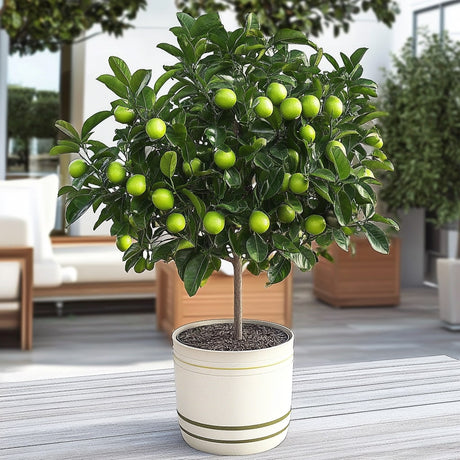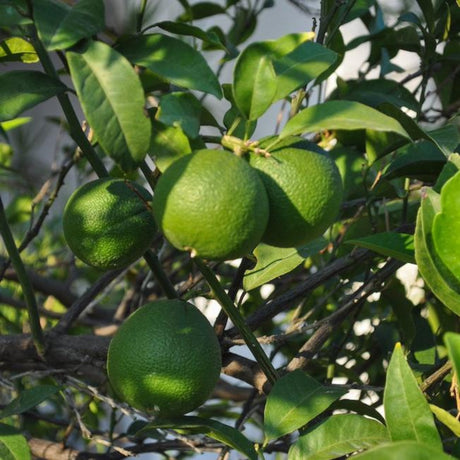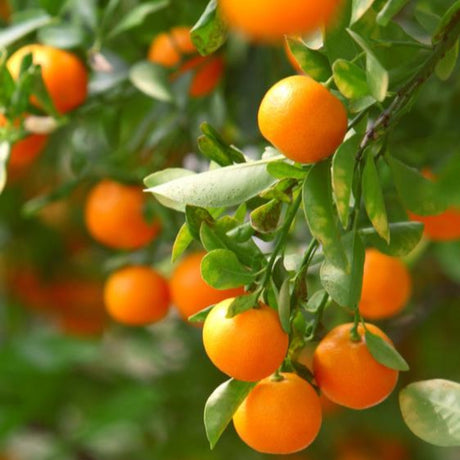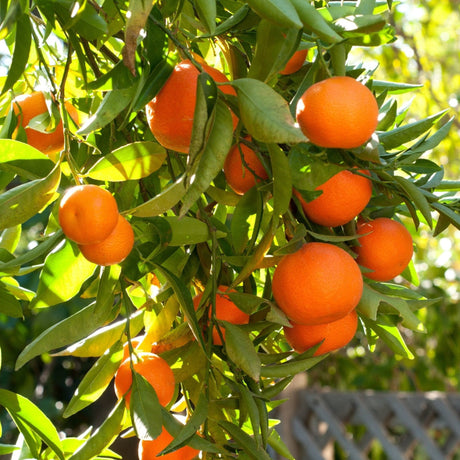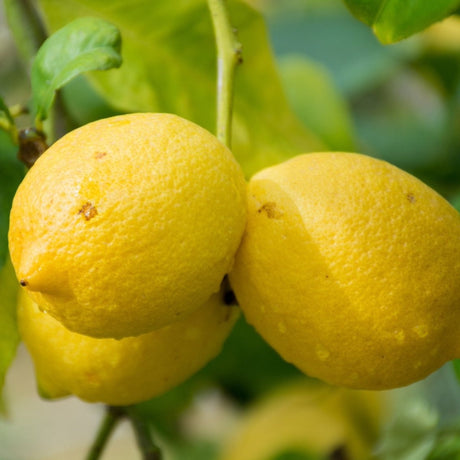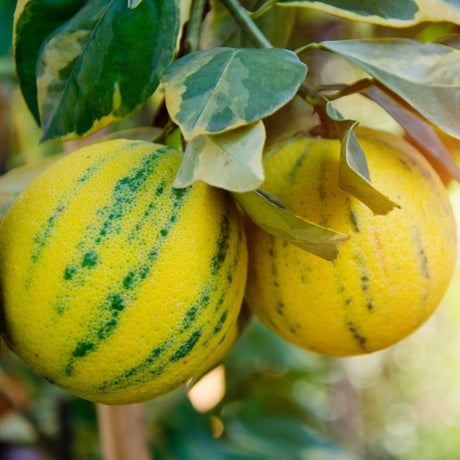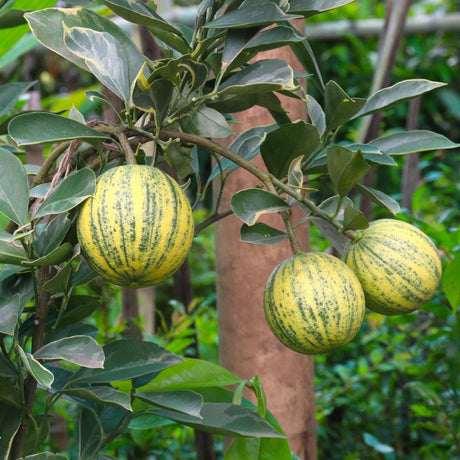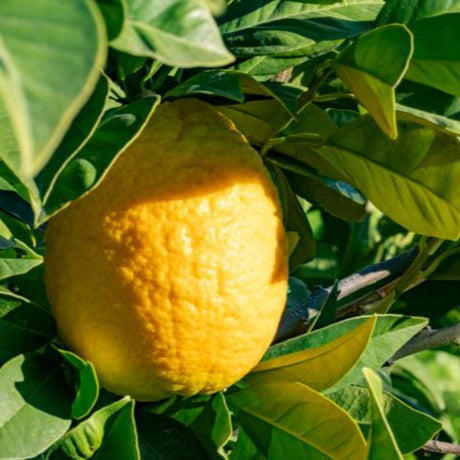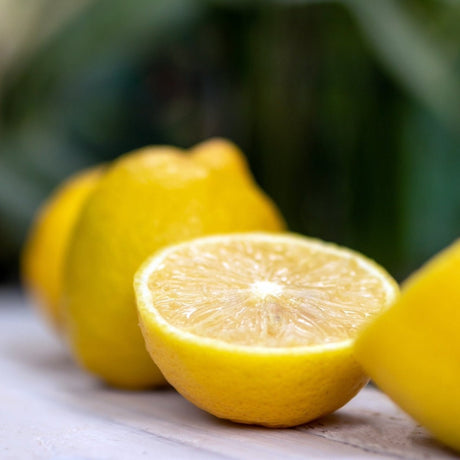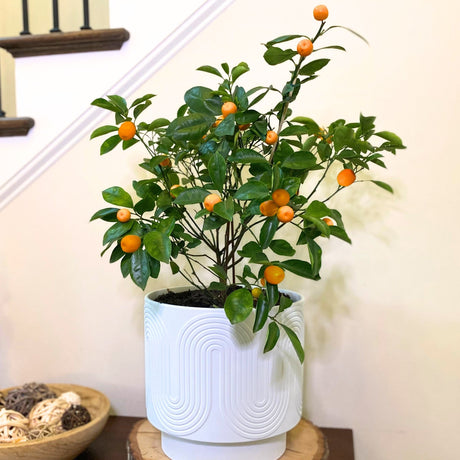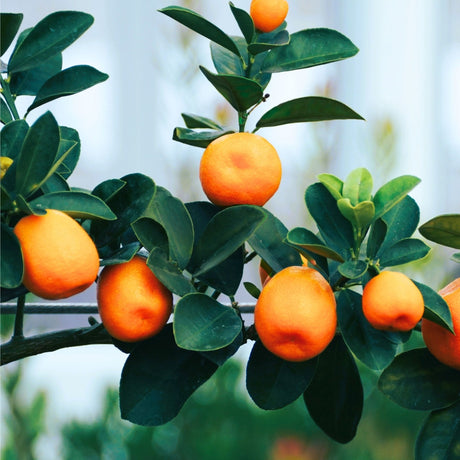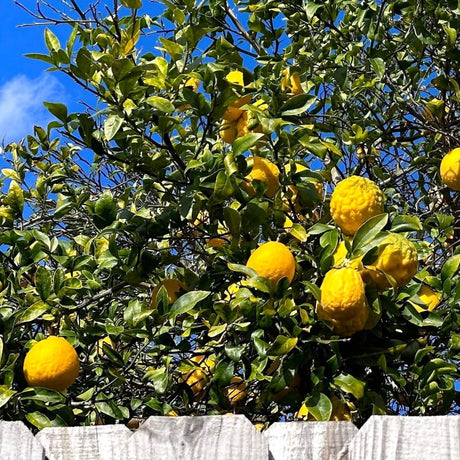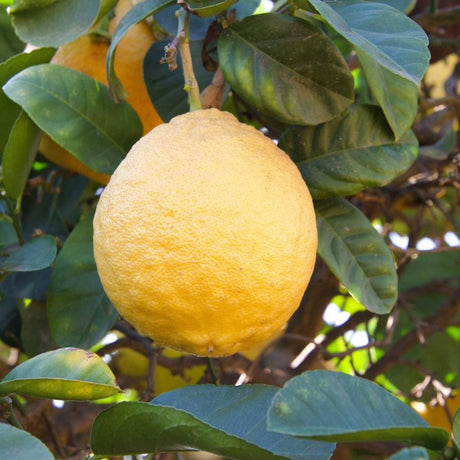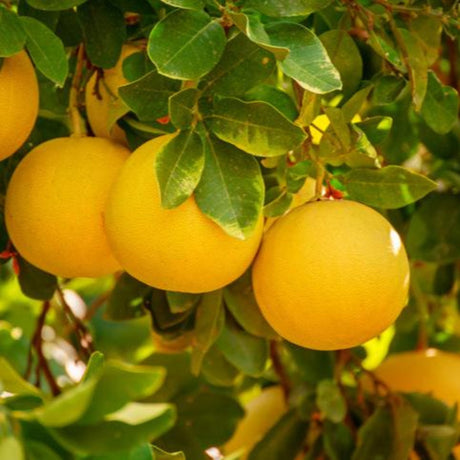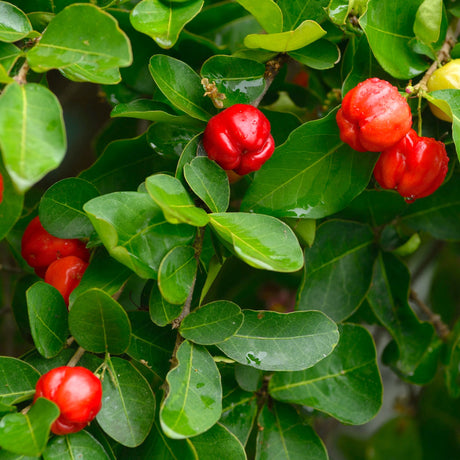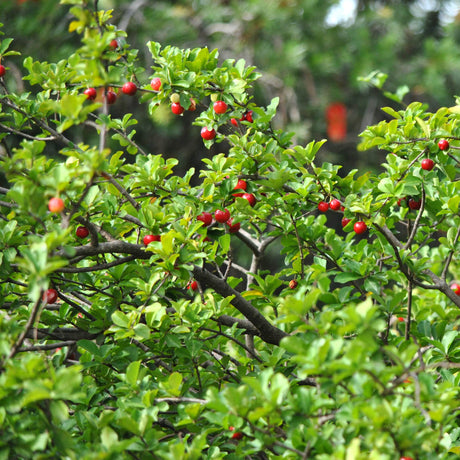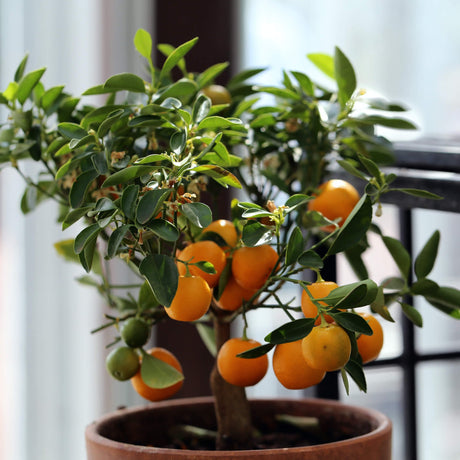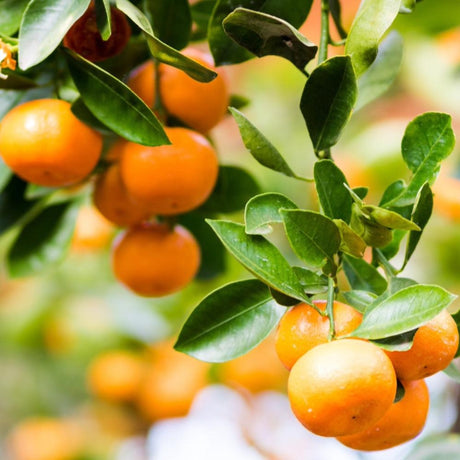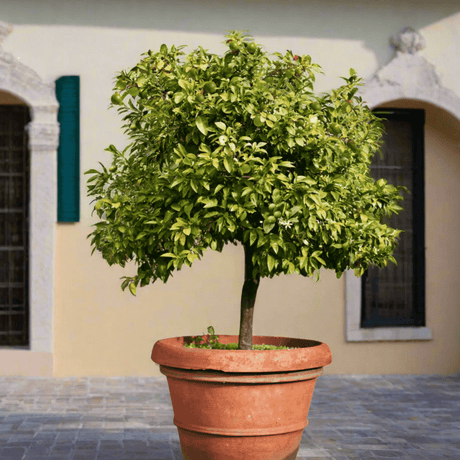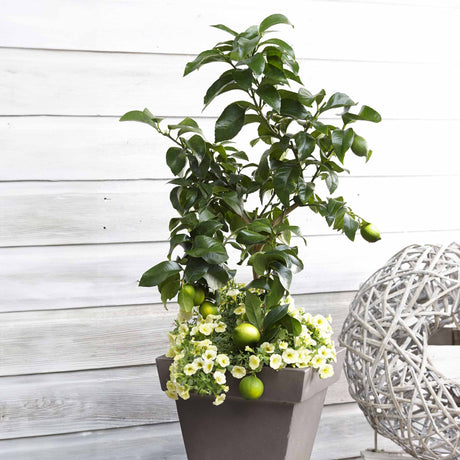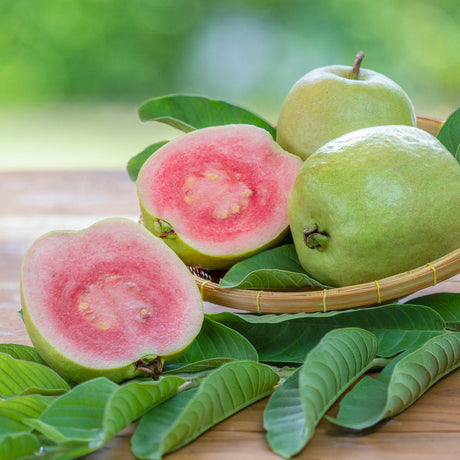- $11995
$25995Unit price /Unavailable - $9995
$17995Unit price /Unavailable - $11995
$25995Unit price /Unavailable Barbados 'Acerola' Cherry Tree
$9995$19995Unit price /Unavailable- $8995
$20795Unit price /Unavailable - $5295
$11995Unit price /Unavailable
Citrus Trees: Brighten Your Landscape with Fruit and Fragrance
Citrus trees are an excellent addition to any garden, providing not only delicious, fresh fruit but also fragrant blossoms and vibrant, evergreen foliage. Whether you’re growing lemons, limes, or mandarins, these trees can enhance your landscape with both beauty and bounty. Citrus trees are easy to care for and can be grown in a variety of climates, making them a versatile choice for any gardener.
Why Choose Citrus Trees?
Fresh, Homegrown Citrus Fruit
Enjoy the unparalleled taste of homegrown citrus by planting your very own lemon, lime, or grapefruit trees. Citrus trees provide a reliable and abundant harvest year after year, allowing you to enjoy fresh fruit for cooking, juicing, or simply snacking. From the tangy flavor of Key Limes to the sweetness of Mandarins, your garden will be brimming with flavor.
Fragrant Blooms and Evergreen Foliage
In addition to their fruit, citrus trees are prized for their fragrant blossoms and lush, glossy leaves. The sweet scent of citrus flowers will perfume your garden each spring, while the evergreen foliage provides year-round greenery, making these trees as beautiful as they are productive.
Variety of Citrus Options for Sale
From the zesty Key Lime to the sweet Clementine Mandarin, there’s a citrus tree to fit every need. Many varieties can be grown in containers, making them perfect for small gardens, patios, or even indoor growing. Whether you’re looking for a compact bush or a taller, tree-like variety, citrus trees offer flexibility and a tropical touch to your home or garden.
Popular Citrus Trees for Your Garden
- Botanical Name: Citrus × meyeri
- Mature Height: 6-10 ft.
- Why Choose It: The Improved Meyer Lemon Tree is a popular, compact option that produces slightly sweeter lemons than traditional varieties. Its size makes it perfect for small spaces or container growing, while still delivering an abundant harvest.
- Botanical Name: Citrus aurantiifolia
- Mature Height: 6-10 ft.
- Why Choose It: Known for its small but flavor-packed fruit, the Key Lime tree is perfect for home chefs and cocktail lovers alike. Its manageable size makes it ideal for growing in containers or small spaces.
California Honey Mandarin Tree
- Botanical Name: Citrus reticulata
- Mature Height: 8-10 ft.
- Why Choose It: This mandarin variety is loved for its exceptionally sweet, easy-to-peel fruit. The California Honey Mandarin is perfect for growing fresh mandarins at home, offering a prolific harvest of juicy, seedless fruit.
- Botanical Name: Citrus japonica
- Mature Height: 6-8 ft.
- Why Choose It: The Fukushu Kumquat tree produces small, oval-shaped fruit with a sweet peel and tart flesh. This compact tree is well-suited to containers and makes a striking addition to patios or small gardens.
- Botanical Name: Citrus latifolia
- Mature Height: 6-10 ft.
- Why Choose It: The Persian 'Bearss' Lime is larger and less acidic than other lime varieties, making it ideal for culinary use. This tree is a heavy producer, offering a generous harvest of limes year after year.
Factors to Consider When Choosing Citrus Trees
Climate and Hardiness
Citrus trees thrive in warm, sunny climates, typically growing best in USDA zones 9-11. However, many citrus varieties can be grown in containers and moved indoors during colder months, making them suitable for gardeners in cooler regions. Whether you're growing the sun-loving Lisbon Lemon or the more compact Ponderosa Lemon, be sure to choose a variety that fits your local climate or plan for container growing.
Size and Space
Citrus trees range in size from compact bushes like the Improved Meyer Lemon to larger trees like the California Honey Mandarin or an Orange Tree. If you’re short on space, consider smaller varieties like the Fukushu Kumquat or Key Lime Bush, which can be grown in containers and moved indoors during winter. For larger spaces, trees like the Lisbon Lemon or Persian 'Bearss' Lime can be grown directly in the ground.
Fruit Production
Citrus trees are productive fruit bearers, often producing fruit within 2-3 years of planting. Choose a tree that suits your culinary needs, whether you’re looking for lemons for baking, limes for cocktails, or mandarins for fresh snacking. Some trees, like the Meyer Lemon, can produce fruit year-round in warm climates, offering a consistent harvest.
Care and Maintenance
Citrus trees are relatively low-maintenance, but they do require regular watering, fertilization, and plenty of sunlight. Be sure to provide your citrus tree with at least 6-8 hours of sunlight per day, and use a citrus-specific fertilizer to promote healthy growth and fruit production.
Planting and Caring for Citrus Trees
Planting Tips
Citrus trees prefer well-draining soil and plenty of sunlight. If planting in the ground, choose a sunny location that gets at least 6-8 hours of direct sunlight. For container-grown trees, use a high-quality potting mix and ensure the container has good drainage. Water deeply after planting and regularly during the first growing season to help the roots establish.
Watering and Fertilization
Citrus trees need regular watering, especially during dry periods. Water deeply, but be careful not to overwater as citrus trees do not like soggy soil. Use a citrus-specific fertilizer during the growing season to provide essential nutrients for fruit production and healthy foliage.
Pruning and Maintenance
Prune citrus trees to maintain their shape and remove any dead or damaged branches. Container-grown trees may need more frequent pruning to manage size. Regularly check for pests such as aphids and scale, and treat promptly to ensure healthy growth.
What Customers are Saying
"We decided to grow a Meyer Lemon Bush indoors, and although we had to be patient while the fruit grew to full size, it’s been such a rewarding experience! Not only does the plant add a touch of natural beauty to our living space, but it’s also become a great conversation piece when friends and family visit. The fragrant blossoms and vibrant fruit really catch everyone’s attention.
Beyond its visual appeal, we’ve noticed some unexpected benefits. We’ve heard before that having plants indoors can help reduce stress, and that’s certainly been true for us. The act of caring for the plant and watching it grow has become a relaxing part of our routine. We also believe it’s improving the air quality in our home, which makes us feel even better about bringing a little bit of nature indoors. We love having this Meyer Lemon Bush as part of our home!"
FAQs
1. Can I grow citrus trees in a cooler climate?
Yes, many citrus trees can be grown in containers and brought indoors during colder months. Place your tree in a sunny location indoors, such as near a south-facing window, to ensure it receives enough light.
2. How much sun do citrus trees need?
Citrus trees need at least 6-8 hours of direct sunlight per day to thrive. If growing indoors, be sure to place your tree in a bright, sunny spot to ensure proper growth and fruiting.
3. How long does it take for citrus trees to bear fruit?
Citrus trees typically start producing fruit within 2-3 years of planting. Grafted trees may bear fruit sooner, while trees grown from seed may take longer.
4. Do citrus trees need to be fertilized?
Yes, regular fertilization is important for citrus trees, especially during the growing season. Use a fertilizer formulated specifically for citrus trees to ensure they get the right nutrients for healthy growth and fruit production.
5. Can citrus trees be grown in pots?
Yes, many citrus varieties are well-suited for container growing, such as the Improved Meyer Lemon and Key Lime Bush. Be sure to use a large container with good drainage, and move the tree indoors during colder months if you live in a cooler climate.
6. How do I protect my citrus tree from frost?
If your area experiences frost, it's best to grow your citrus tree in a container so it can be moved indoors during winter. If planted in the ground, cover your tree with frost cloth or blankets during freezing temperatures to protect it from frost.



















